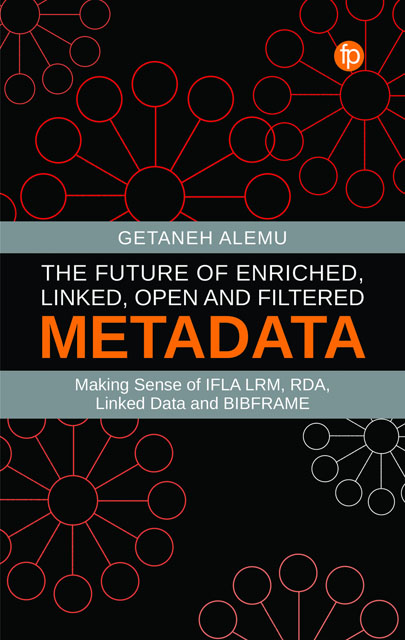 The Future of Enriched, Linked, Open and Filtered Metadata
The Future of Enriched, Linked, Open and Filtered Metadata Book contents
- Frontmatter
- Contents
- Figures
- Tables
- Code snippets
- About the Author
- Preface
- Acknowledgements
- Abbreviations
- 1 Introduction to Metadata
- 2 Metadata Strategies and Quality Indicators
- 3 Metadata Use Cases
- 4 Contemporary Metadata Principles
- 5 Enriched and Linked Metadata
- 6 Open Metadata
- 7 Filtered Metadata
- 8 FRBR, LRM and the Notion of Work
- 9 Resource Description and Access (RDA)
- 10 BIBFRAME: A New Metadata Framework
- 11 Crowdsourcing and User-Generated Metadata
- References
- Index
1 - Introduction to Metadata
Published online by Cambridge University Press: 18 November 2022
- Frontmatter
- Contents
- Figures
- Tables
- Code snippets
- About the Author
- Preface
- Acknowledgements
- Abbreviations
- 1 Introduction to Metadata
- 2 Metadata Strategies and Quality Indicators
- 3 Metadata Use Cases
- 4 Contemporary Metadata Principles
- 5 Enriched and Linked Metadata
- 6 Open Metadata
- 7 Filtered Metadata
- 8 FRBR, LRM and the Notion of Work
- 9 Resource Description and Access (RDA)
- 10 BIBFRAME: A New Metadata Framework
- 11 Crowdsourcing and User-Generated Metadata
- References
- Index
Summary
Overview
This section defines, explains and provides a briefhistorical background to metadata and its benefits.Metadata is central to any information organisationand management function. Metadata – enriched,linked, open and filtered – drives the visibility,discoverability, access and use of resources.Metadata serves as a tool to search, navigate andexplore information. The return on investment foracademic libraries is tied to access, usage andimpact of information resources. Without accurate,consistent and quality metadata on the one hand andan easy-to-use and effective discovery service onthe other, these valuable resources may remaininvisible and inaccessible to users. These goals sitat the centre of any information organisationfunction. This section also argues that metadata isthe raison d’être for libraries, archives,galleries, museums and any content creating andmanaging institutions.
What is metadata?
Some consider metadata as overly complex jargon.However, all of us use it in our daily lives.Metadata is a keyword or set of keywords peopleenter in a search interface such as Google, Bing,Yahoo, YouTube, Amazon and a library catalogue. Itnames things, people, places and objects in adatabase. It describes information resources such asbooks, articles, documents, music, films andphotographs. In a social media context, metadata isthe tags, likes, dislikes, ratings, recommendationsand reviews. In short, metadata is an indexinglanguage for finding, refinding and discoveringinformation in an information system.
According to Calhoun (2014), metadata helps structure,encode, mark up, describe, uniquely identify andprovide context for data and information. It helpscreate links, ascertain sources, communicate accessand rights information, and helps ensure futurearchiving and preservation of information objects.For the Resource Description and Access (RDA)standard, metadata is about access points that allowthe user to search and discover. For BIBFRAME,metadata is a set of assertions about a resourceusing the Resource Description Framework (RDF). ForMARC, it is a set of tags along with fields,sub-fields, indicators and specific rules. PREMISmetadata details the descriptive and technicalenvironments such as digital object identifiers,file names, checksums, creating softwareapplication, file format, software version, filesize and access rights.
- Type
- Chapter
- Information
- The Future of Enriched, Linked, Open and Filtered MetadataMaking Sense of IFLA LRM, RDA, Linked Data andBIBFRAME, pp. 1 - 40Publisher: FacetPrint publication year: 2022


